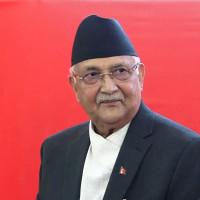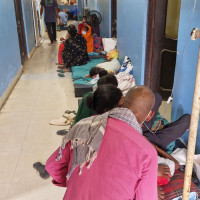- Tuesday, 26 August 2025
Contain Cholera Threat
The outbreak of cholera in the Tarai, particularly Birjung Metropolitan City, has emerged as a serious public health emergency. With the rising confirmed infections and a few reported deaths, locals are now in panic. The spread of cholera at the community level can claim hundreds of lives if efforts are not made promptly to contain it. We have not forgotten how deadly the cholera outbreak in Jajarkot was in 2009. Without immediate action, the situation in Birgunj could also go out of control. Thus, the authorities should gear up an emergency response. There is also a need for sustainable sanitation infrastructures and public health preparedness to prevent the spread of any communicable disease, including cholera.
The Tarai is now battling with the dire scarcity of drinking water. As a result, it is difficult for people to get clean drinking water and maintain proper sanitation. Many communities lack awareness regarding the importance of clean drinking water. Open defecation and open drainage are still prevalent in the Tarai, and during the monsoon, sources of water get contaminated, leading to the outbreak of cholera. A lack of awareness and resources among people escalates the situation, claiming the lives of many.
As per the news published in this daily, a total of 54 patients have been confirmed to have cholera infection as of Sunday afternoon. Approximately 150 patients suffering from diarrhoea and cholera are undergoing treatment across more than a dozen hospitals in Birgunj. The outbreak was first noticed in Ward No. 12 of Murli Tole on August 22, when the locals began visiting the hospitals reporting symptoms of Cholera. The disease has now spread to Ward Nos. 11, 12, 13, 16 and 30, which suggests that the disease has spread to the community level, and without timely intervention, the situation can be dire.
When Cholera reaches vulnerable communities, it becomes very difficult for them to battle the disease that spreads rapidly through contaminated food and water. Cholera can kill patients within hours if they fail to receive treatment on time. People in rural areas have limited access to healthcare facilities. The Madhes government, which provided medicines to hospitals treating the cholera patients the other day, needs to train and equip a rapid response team. Likewise, the federal government needs to intervene so that the diseases can be brought under control soon. The directives given by Home Minister Ramesh Lekhak to the security bodies the other day to remain alert to contain the outbreak of cholera are a move towards this direction. He instructed the security bodies to ensure that a medical team is ready for deployment if necessary.
Likewise, establishing cholera treatment centres in strategic locations can help manage the outbreak effectively. Door-to-door awareness campaigns, educating the public about the importance of boiling water, maintaining good hygiene and recognising the early symptoms of cholera are very important. The government should come forward with long-term plans, like building sustainable sanitation infrastructures and increasing people's access to clean drinking water and short-term plans like being equipped with medical supplies and health professionals, which can be mobilised during the outbreak of the disease.















